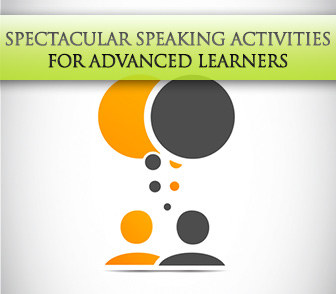Frankly My Dear: Opening Up Viewpoints for Advanced Learners


When it comes to communicating, there is always more they can learn to reach the highest fluency level possible. Try these 3 spectacular speaking activities and watch their skills evolve to a new height.

Open discussion is essential for advanced students to create and experience natural language. The guidelines for open discussion might vary from group to group, but the main elements should remain; each lesson students are exposed to a certain amount of conversation time that is not mediated, where correction does not take place, and where topics are allowed to ramble on according to the whim of the class. Students should lead these open discussions, and in facilitating true open discussion, you want to have some goals and outcomes that the students are aiming for, but do not exactly map out how they are going to get there. These outcomes can be quite generalized, structured around topics and could change for each discussion. You can get ideas from observing students during class time and examining what they need to practice, where there are questions, and what the group on a whole is interested in. An outcome could be as simple and general as, “in this discussion, see how many idioms you can work into the conversation without forcing it.” Another example outcome could be, “Try not to talk about yourself. Learn about others while speaking during this discussion.” Involve students in the outcomes as they have wonderful ideas as well.
Sometimes as teachers, it is difficult to let go of the grammar reigns and allow students to speak without a particular structure or usage in mind. This is particularly what advanced students need and crave. This is not to say that open discussion is a free-for-all in which classroom rules and etiquette do not apply. On the contrary, open discussion is a vehicle for students to communicate with one another within appropriate guidelines while learning a lot about applying usage in practical application.
Discussion exercises that focus on relationships can open up a whole new realm of possibilities for advanced level English speakers. There are a number of ways to bring in the topic of relationships and/or dating in advanced classes. One way to have students explore these topics is to do some version of a matchmaking exercise. Matchmaking exercises work well because students will use a lot of varied language concepts while not taking themselves or the activity too seriously. This is also a topic everyone is interested in, whether they admit it or not, and you can pick and choose which elements students are expected to focus on. Matchmaking activities encompass topics like characteristics, dating challenges, preferences, past experiences, and future expectations. One possibility is to ask the students to create a dating profile or synopsis for another student in the class. This could be accomplished in an interview format where students first come up with a list of questions to be answered and then determine the answers in pairs. This way, they are answering the questions as if they are another student, so it is less intimidating and becomes a lighthearted way to express what they know about each other. When the students have completed their profiles they can present them to the class, and the class then guesses who they pretended to be. You could also approach matchmaking as a role play where students are given specific characteristics, like handsome, successful and egotistical. Another student might have the characteristics angry, beautiful, and lonely. As they are mingling they ask and answer questions as a person with their characteristics would answer. They are then expected to find a good match for themselves. The results are often hilarious, creative, and unexpected.
There are a lot of opportunities where you could creatively have students perform some type of spoken word in front of the class. These exercises tend to work best when they are spontaneous so students don't have time to be nervous, and preparation is also limited. Spoken word leads to a lot of natural language and each student gets a chance to be in the spotlight for a very short time. One way to facilitate spoken word is to utilize those magnetic poetry kits that were so popular a few years ago. If you don't have any of these in stock, they are very useful tools in all levels of ESL classes. There are several themes now and each kit supplies you with 500 or so words on little magnetic pieces that can be put up on the board or handed out in random to students. If you don't have any of these, make some cards with random words and include every part of speech. Don't tailor the cards to specific vocabulary or themes, just create them indiscriminately and hand them out just as randomly. The wonderful thing about the magnetic poetry pieces is students are able to look at hundreds of words to compose a short, eloquent piece of poetry, create one or two lines to speak about, or have other students choose a few words they must include in their spoken work. The spoken work could have a specific aim like, try to be funny, use sarcasm, or rant about a pet peeve. It could also just be left to the words. Students could create something on the spot, share it with their classmates and then expound on it for one or two minutes.
Utilizing these 3 spectacular speaking activities will give your students new ways to speak to one another and increase communication skills.